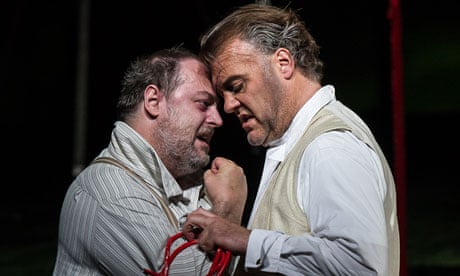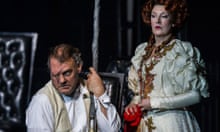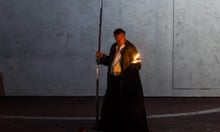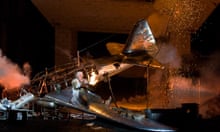"The thing about Wagner," says Keith Warner, "is that there can be no true success in any production of his operas, only degrees of failure. There is so much in these bloody pieces, all you can do is try to live up to them."
We are in a room high up above Covent Garden, speaking a few days before the curtain rises on Das Rheingold, the first opera in Wagner's epic four-part Ring Cycle. In a pre-emptive celebration of next year's Wagner bicentenary, the cycle is getting four complete performances during the next few weeks at the Royal Opera House. No production in British Wagnerian history has been as quick to sell out, or as luxuriously cast: Warner's performers include bass-baritone Bryn Terfel (probably the best Wotan, ruler of the gods, in the world just now) and the conductor Antonio Pappano, who Warner simply calls "the greatest".
When Warner's Ring first came here in 2004, the reviews were mixed. Personally, I found the imagery of the third and fourth operas, Siegfried and Götterdämmerung, confused, as if Warner and his designer Stefanos Lazaridis were trying to cram everything they could on the opera house stage in an attempt to say everything about the Ring through a heady mix of abstraction and naturalism, human passion and mythical symbolism. "I'll be honest," says Warner. "There was too much going on. Some people did feel there was too much information on the stage, that it was moving too fast. So I've been doing some weeding."
Still, the production didn't hold back when it came to the Ring's search for social, spiritual, human and political truths. "There's a quote of Wagner's that many find surprising. He said, 'I will only be happy when the person who gets the loudest applause is the person who has acted best, who has shown the character in the truest way, not the person with the best voice.'"
Warner thinks that is why Wagner wanted to direct, rather than conduct, the first Ring Cycle at his theatre in Bayreuth in 1876. "He wanted to make his operas pseudo-religious experiences instead of entertainment," says Warner. "And if you're going to do that kind of theatre today, it's going to be difficult. What's special about doing it here at Covent Garden is that everyone wants the Ring to be significant and meaningful; they want their characters to convey deeper things than just a lovely night out with music."
Warner puts Wagner ahead of Chekhov or Ibsen as a revolutionary of the theatre, someone who wanted theatre to be at the centre of civic life, an ambition from which Warner says we've only retreated further and further. But there's more to Warner's vision of Wagner's revolution in the Ring. Warner sees the cycle as a journey from a world ruled by gods to a place where their power is relinquished to humans. It's a reading backed up by the writings of philosopher Ludwig Feuerbach, whom Wagner was studying while working on the Ring texts in the 1850s. Feuerbach's most radical idea was that God is a projection of man's imagination – not the other way round. The Ring enacts that inversion as Valhalla, the home of the gods, which finally goes up in flames thanks to the power of Brünnhilde's love for Siegfried; the world is then handed over to an uncertain, all-too-human future. "What's so amazing about Wagner as a dramatist," says Warner, "is that he makes Wotan the one person who is most aware of the necessity of his own destruction. But when we get to the end of Götterdämmerung, we find that a world without gods isn't necessarily going to be a better one. People aren't necessarily going to be free."
That's the great unanswered question: what happens after the Ring ends? There's hardly a resolution: the Rhinegold that started it all is returned to the Rhinemaidens, but the world has changed utterly, and pretty well all the certainties that the drama was built on have crumbled into the ashes of Brünnhilde's suicide pyre. It's one of the most nihilistic endings in the history of human creativity.
What's Warner's view? "I think the end of the Ring is actually saying that the only possible redemption is to be found not through Brünnhilde's love or anything on stage, but in those of us who have gone through the last 16 hours together, in what we do next. We are joined in the artwork, and if we've learned anything, it's about what we do when we leave the opera house, about how we want to live. We have the choice to do something or not to, but if we do, we just might change the world. If you were part of a revivalist Christian sect, you'd bring up the house lights and get everyone to hold hands at the end. But you can't do that without it becoming schmaltzy. Instead, I have a single female figure surmounting the finally complete circle that has been warped and fragmented throughout the rest of the cycle. This hasn't just been a lovely massage in Wagnerian chromaticism: it's been about the world – so go out and do something!"




Comments (…)
Sign in or create your Guardian account to join the discussion